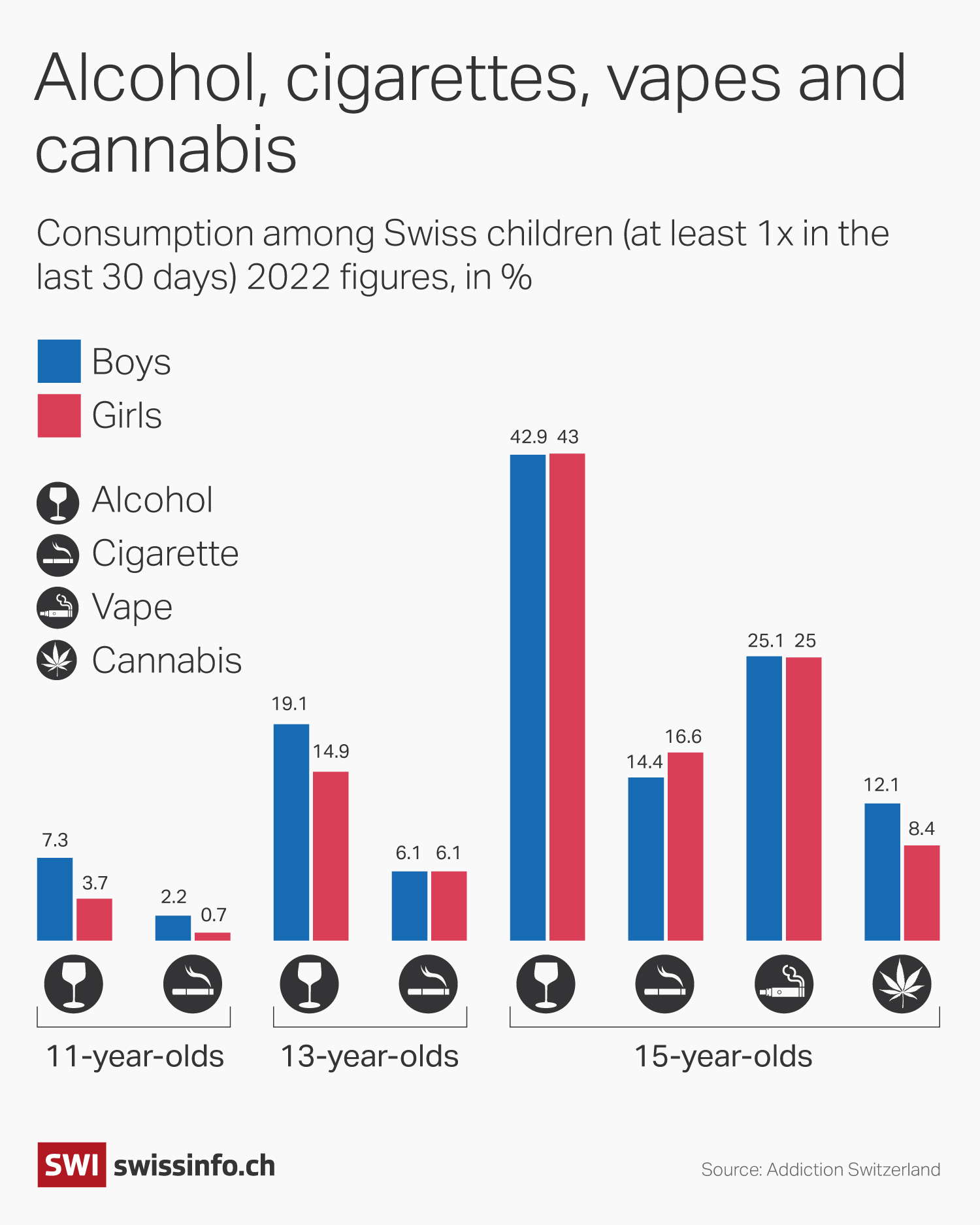Could Switzerland follow the UK and ban disposable vapes?

Britain plans to ban disposable e-cigarettes, as part of a drive to curb youth vaping. Several dozen countries have also outlawed single-use vapes. In Switzerland however, home of the HQs of major tobacco companies, such a move appears unlikely for now.
Earlier this week, the UK government announcedExternal link that it would ban the sale of disposable vapes and limit flavours marketed at children to prevent them from becoming addicted to nicotine. A ban could be in force from early 2025.
It is currently illegal to sell vapes or tobacco to children under 18 in the UK, but officials say that youth vaping has tripled in the past three years – with 9% of 11- to 15-year-olds now using them – and that cheap, colourful disposable vapes in flavours like bubble gum and candy floss are a “key driver”.
“Children shouldn’t be vaping; we don’t want them to get addicted. We still don’t understand the full long-term health impacts of vaping. So, it is right we take strong action to stamp this out,” Prime Minister Rishi Sunak declared.
What’s the vaping situation in other countries?
Vapes were banned in 34 countries as of July 2023, according to the World Health Organization (WHO), including Brazil and India. But many countries struggle to enforce e-cigarette rules, meaning they are often available illegally. Last month, France’s National Assembly approved a bill to ban single-use vapes to protect young people. Ireland and Germany are considering similar measures.
A total of 74 countries, mostly in Africa but also including Pakistan and Colombia did not regulate vapes at all as of July 2023, WHO figures showed. In other nations, including important markets like the US and China, authorities allow vapes but regulate their use.
What’s the situation in Switzerland?
In Switzerland, e-cigarettes containing nicotine are considered a commodity under Swiss law and are not included within restrictions on conventional cigarettes.
But changes are underway. Although Bern is not planning to ban the sale of disposable vapes, from June 2024 e-cigarettes will be regulated by the new Federal Act on Tobacco Products and Electronic Cigarettes and should not be sold or marketed to under-18s. A ban on advertising of tobacco products and e-cigarettes aimed at youngsters will affect print media, online advertising and festivals in the Alpine country.

More
Swiss back further restrictions on tobacco advertising
Certain regional authorities have already acted more swiftly. Around 11 cantons, including all six in French-speaking Switzerland, have banned sales of e-cigarettes to under 18s.
What are the health arguments for and against vaping?
In December 2023, the World Health Organization (WHO) issued a health warning, urgingExternal link governments to protect children and to treat vapes similarly to tobacco and ban all flavours.
The British government admits vaping can help adults to quit smoking but says children should never vape. The nicotine in e-cigarettes can be highly addictive, officials sayExternal link. Withdrawal sometimes causes anxiety, trouble concentrating and headaches, and the long-term health effects are “unknown”.
But industry groups argue that vapes pose significantly lower health risks than tobacco, and flavours were key in encouraging smokers to switch.
Disposable vapes arrived on the Swiss market in 2020 and have become popular among young people. A 2022 studyExternal link by Unisanté in Lausanne, in collaboration with Promotion santé Valais, confirmed the extent of vaping in French-speaking Switzerland: 59% of 14–25-year-olds had tried an e-cigarette at least once and 12% vape frequently (ten days or more in the last 30 days), including 9% of 14–17-year-olds.
A separate study by Addiction Switzerland, published in 2023, saidExternal link that one in four 15-year-olds had vaped at least once in the previous 30 days.

What do Swiss politicians say about vaping?
Concerns remain about their growing appeal among young people. Swiss parliamentarian Laurence Rielle Fehlmann, a leftwing Social Democrat, has warnedExternal link about the quality of vaping products sold in Switzerland.
Calls for a Swiss ban have also been heard. A study by a panel of 38 experts, published in the Swiss Medical ReviewExternal link in February 2023, recommended a prohibition of the sale of disposable vapes. “If this is not feasible, certain aspects concerning the composition of the product, its marketing, its sale and its consumption must be strictly regulated,” it concluded.
And last year Christophe Clivaz, a Green Party MP, filed a motionExternal link with cross-party support calling for a ban on single-use vapes, which he says are “particularly harmful to the health of (pre-)adolescents and represent a real ecological problem”.

More
Up in smoke: what happens to disposable e-cigarettes?
In reply, the Federal Council agreed that cheap disposable vapes have the potential to be highly addictive and that they raise environmental issues.
But the government has turned a deaf ear for now. It rejected the motion, arguing that changes to federal law soon coming into effect will “strengthen the protection of the population, particularly young people”. A higher tax on single-use vapes will make them more expensive and dissuade young buyers, while efforts are also underway to improve the collection and recycling of vapes, it said.
The government added that it cannot act alone: “Even if steps are underway in several countries, such a ban does not currently exist in the European Union. A ban on the sale of single-use electronic cigarettes limited to Switzerland would therefore create a new technical barrier to trade.”

More
Switzerland: the land of the tobacco industry
Edited by Reto Gysi von Wartburg/dos

In compliance with the JTI standards
More: SWI swissinfo.ch certified by the Journalism Trust Initiative













You can find an overview of ongoing debates with our journalists here . Please join us!
If you want to start a conversation about a topic raised in this article or want to report factual errors, email us at english@swissinfo.ch.